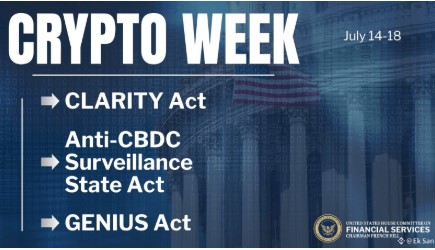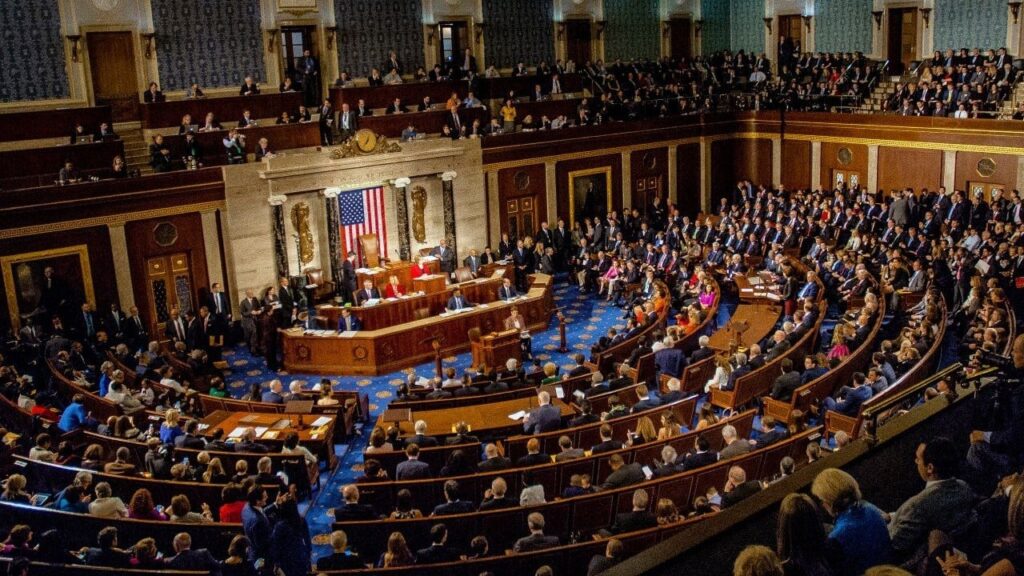
The U.S. House of Representatives has officially designated the week of July 14, 2025, as “Crypto Week,” signaling a major legislative push to define the future of digital assets in America.
Led by House Financial Services Committee Chairman French Hill, House Agriculture Committee Chairman GT Thompson, and House Republican leadership, Congress plans to bring to the floor three significant bills:
- The CLARITY Act – which aims to establish a regulatory framework for digital assets and clarify oversight between the SEC and CFTC.
- The Anti-CBDC Surveillance State Act – a bill to ban the creation of a U.S. Central Bank Digital Currency (CBDC) over concerns it could infringe on Americans’ financial privacy.
- The GENIUS Act (from the Senate) – focusing on broader innovation and competitiveness in the digital asset space.

Why It Matters:
This legislative package represents the most coordinated and aggressive effort yet by Congress to position the United States as a global leader in cryptocurrency and blockchain innovation.
With strong support from House and Senate Republicans, and President Trump’s endorsement, the bills reflect a broader GOP agenda to support financial innovation while guarding against government overreach, especially in the context of CBDCs.
Key Voices:
- Chairman French Hill: Described the bills as “historic steps” to provide long-awaited clarity to innovators and ensure the U.S. remains competitive in the digital economy.
- Speaker Mike Johnson: Said the legislation reflects “President Trump’s digital assets and cryptocurrency agenda,” and praised bipartisan committee efforts.
- Majority Leader Steve Scalise & Whip Tom Emmer: Framed the effort as a push for privacy, economic growth, and U.S. dominance in blockchain technology. Emmer specifically emphasized protecting Americans from surveillance via CBDCs.
- Chairman GT Thompson: Stressed the importance of regulatory certainty after years of discussions and hearings with stakeholders from across the digital asset ecosystem.
- Senators Tim Scott, John Boozman, Bill Hagerty, and Cynthia Lummis: Expressed strong support and readiness to move these bills through the Senate. Lummis highlighted Wyoming’s early leadership and welcomed the federal alignment.
The Bigger Picture:
- CLARITY Act: A product of bipartisan work, it sets rules for what constitutes a digital asset vs. a security or commodity, helping businesses understand how to operate legally in the U.S.
- Anti-CBDC Surveillance State Act: A response to concerns that a U.S. digital dollar could be used for government surveillance, reflecting broader conservative skepticism about central bank digital currencies.
- GENIUS Act: Focuses on innovation policy and competitiveness, likely addressing tax treatment, R&D support, and cross-border digital commerce.
Timeline & Legislative Background:
- The digital asset agenda has been in the works for years, with notable legislative wins like the 2024 passage of the FIT21 Act, the first comprehensive crypto regulation to clear the House.
- In 2025, multiple hearings, roundtables, and bipartisan votes have led to this moment, culminating in what’s expected to be a landmark week for crypto policy in the U.S.
What’s Next:
- If passed in the House, these bills will head to the Senate, where leaders like Tim Scott, Cynthia Lummis, and Bill Hagerty have pledged to move quickly.
- If signed by President Trump, this would mark a major turning point in U.S. digital asset regulation, establishing national policy on everything from stablecoins to crypto exchanges to blockchain privacy rights.
Bottom Line:
Crypto Week marks a significant milestone in America’s digital asset journey. With strong political momentum, support from the Trump Administration, and a focus on innovation, privacy, and economic leadership, the United States is poised to make major moves in crypto regulation — potentially shaping the global future of finance.


